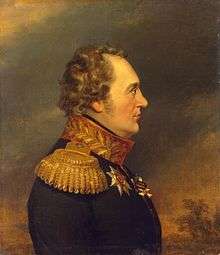Magnus Gustav von Essen
Magnus Gustav von[1] Essen (Russian: Иван Николаевич Эссен; Ivan Nikolaevich Essen; 30 September [O.S. 19] 1759 – July 20 [O.S. 8] 1813) was a Baltic German lieutenant general and military governor of Riga at the start of the Patriotic War of 1812.
Magnus Gustav von Essen | |
|---|---|
 Portrait of Essen by George Dawe | |
| Born | 30 September [O.S. 19] 1759 Pöddes Manor, Pöddes, Wierland County, Governorate of Estonia, Russian Empire (in present-day Kalvi, Lääne-Viru County, Estonia) |
| Died | July 20 [O.S. 8] 1813 (aged 53) Baldohn, Bauske County, Courland Governorate, Russian Empire (in present-day Baldone Municipality, Latvia) |
| Allegiance | |
| Rank | lieutenant general |
| Battles/wars | Battle of Friedland, Patriotic War of 1812 |
| Awards | Order of St George, 4th degree |
Life
Pre-1812
From the Essen family in Estonia, from 1783 to 1785 he fought in Poland, where he was seriously injured. He fought in the Russo-Swedish War (1788–1790) as well as Russia's 1792 and 1794 Polish campaigns. For his service at the Battle of Maciejowice he was awarded the 4th degree of the Order of St George.
In 1799 he commanded the first division in the Anglo-Russian invasion of Holland under the command of general Johann Hermann von Fersen. From 1802 he was the military governor of Smolensk. He then fought in the 1807 war against Napoleon, being seriously wounded at Friedland.
1812
During the Patriotic War of 1812 he served as Military Governor of Riga in place of Dimitri Lobanov-Rostovsky and was forced to set fire to Riga's suburbs as soon as the enemy captured their outermost edge. After unsuccessful attempts to stop the Prussians at a distance from the city and unsuccessfully fighting to save Iecava, he ordered the burning of the suburbs but because of a strong wind the fire got out of control and thousands of city residents were left homeless.[2]
Towards autumn the war changed direction. The Prussian corps became overextended, Macdonald remained inactive, a Russian successes was won by Peter Wittgenstein at Polotsk, Napoleon began a general retreat and Fabian Steinheil arrived in Riga - all these circumstances brought Essen to the top of the pile, but due to mismanagement the Russians were unable to capitalise on these victories and suffered heavy losses in several battles. In October Essen was replaced in his post by General Paulucci and filed his resignation.
Essen then went for a long course of treatment at the Baldone sulphur baths near Riga, where he drowned on 23 August 1813 while swimming. According to one version of events, he committed suicide on the anniversary of the firing of the Riga suburbs. He appears in The Commodore novel of the Horatio Hornblower series.
Family
His father was Klaus Gustav von Essen, a statesman, and his mother was Magdalena Elizabeth von Stackelberg. Essen married Margeratha von Stackelberg in 1796, they had a daughter, Elizabeth Anna Dorothea, who was married to the Russian general Carl Magnus von der Pahlen (ru).
Notes
- In German personal names, von is a preposition which approximately means of or from and usually denotes some sort of nobility. While von (always lower case) is part of the family name or territorial designation, not a first or middle name, if the noble is referred to by surname alone in English, use Schiller or Clausewitz or Goethe, not von Schiller, etc.
- There is an erroneous myth that the Riga suburb was burned due to a herd of cows. At the core of this myth was a real event - when Major Apushkina saw a dust cloud on the road to Mitava and, thinking it was the French on their way, set fire to the bridge at Dobele (though this story is not relevant to the outskirts of Riga).
Sources
- (in Russian) Dictionary of Russian generals, members of hostilities against the army of Napoleon Bonaparte in the 1812-1815 war. / / The Russian archive: Sat. — М .: студия «ТРИТЭ» Н.Михалкова, 1996. - M.: Studio «TRITE» N. Mikhalkov, 1996. — Т. VII. - Vol VII. — С. 630-631. - S. 630-631.